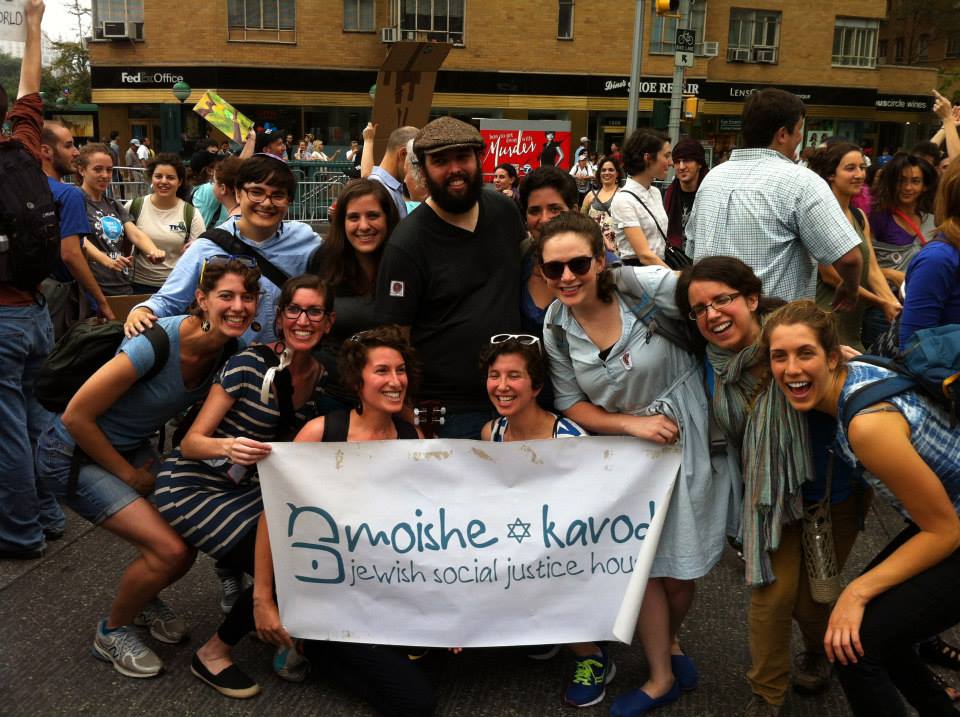One of the major progressive events of 2014 was the powerful gathering of over 400,000 people calling for action around climate change in New York City. Jewish Organizing Fellow alum Davida Ginsberg was there, and she recently reflected on her experiences with organizing, environmental work and justice:
Earlier this fall, I was one of over 400,000 people who attended the People’s Climate March in New York City to demonstrate to our world leaders the urgency of climate change as an issue that affects all people and all social justice issues. Several days before Rosh Hashanah, I found myself on West 58th Street in Manhattan standing shoulder to shoulder alongside Jews, Buddhists, Catholics, Humanists, Pagans, and many others from faith communities, all of us waiting for the largest climate march in history to begin. Immediately surrounding me were friends from the Boston Jewish community — JOIN fellows and alumni, members of the Moishe Kavod House, and rabbinical students at Hebrew College. Inches from my ear shofar blasts sounded, signaling the urgency of climate change and the need for a collective “wake-up” call to take action. But it also served as a wake-up call for me. Being a part of the march both renewed my connection to climate change as an issue I care about and deepened my analysis of it as a meta-social justice issue connected to all other forms of inequality and injustice in our world.
Growing up in a family that composted, recycled, and spent many dinner time conversations discussing sustainable modes of transportation or cutting edge “green” technologies, I became an environmentalist early on. It was the issue that my parents cared about, so I cared about it. As I got older, climate change — or rather a fear of it — inspired me to actively choose environmentalism as something that I personally cared about. I watched An Inconvenient Truth and felt overwhelmed and fearful about the future of our planet, and so in college I coordinated a recycling program on campus and after graduating I spent time living on a farm and learning sustainable agriculture.
Yet when I moved to Boston to do JOIN, I saw for the first time my identity as an environmentalist in contrast with other social justice issues. Surrounded by JOIN fellows and alumni advocating for equal access to healthcare, labor conditions, and economic opportunity for all, I saw the environmental movement from which I had been raised as a movement of privilege, one that has historically focused on conservation of the earth and less on the people that are affected by environmental degradation. And so I took a break from it. I began my JOIN fellowship year working at Rosie’s Place, a shelter for women experiencing poverty and homelessness. Even as I learned about environmental justice organizations like ACE (Alternatives for Community and Environment), I still felt disconnected from the mainstream environmental movement.
Late this summer when I learned about the climate march, I was at first skeptical. But as I learned more, I realized that the organizers had intentionally designed the march to tell the “people’s” story of climate change: with indigenous and low-income communities at the front of the march to illustrate that the groups who should be leading the movement are the ones disproportionately affected. This framing was transformative for me — it inspired me to march, to reconnect with an issue I had taken a step back from, and also to connect more authentically with those around me — with the vast multitudes of people everywhere.
On the trip down, at 8 am that Sunday morning, I felt the power of people that poured from myriad coach buses and flooded the rest stop on I-95. Waiting for the march to begin, I felt the pulsating power of community as I saw so many people from different faith traditions who had shown up because they care about the environment, but also, and perhaps more accurately, because they care about each other. And reaching beyond my comfort zone, I talked to a total stranger — a security guard standing by — about climate change and why we had all come together to march.
Climate change is big. It is scary. It is overwhelming. But being a part of the march and connecting with the issue on a human level enabled me to, for the first time ever, connect with the issue from a place of hope, rather than fear. It was a brief yet powerful glimpse of what it possible when we all come together — across race, class, gender, issue, and faith.
Davida Ginsberg is a Boston-based community organizer and food justice activist. She is an alum of the JOIN for Justice Jewish Organizing Fellowship.







